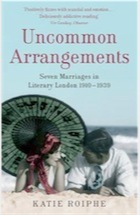 New York is slowly being carpeted by fine snow tonight. Not nearly a blizzard but just enough to make a person want to stay inside with a cup of hot chocolate and read an adventure story. Or, in my case, post about an adventure story I read at the beginning of the month. It's the kind of weather that lends itself to adventures of the mind while the body tucked up in a chair.
New York is slowly being carpeted by fine snow tonight. Not nearly a blizzard but just enough to make a person want to stay inside with a cup of hot chocolate and read an adventure story. Or, in my case, post about an adventure story I read at the beginning of the month. It's the kind of weather that lends itself to adventures of the mind while the body tucked up in a chair.I can understand why a person would read comparisons to Dickens and Robert Louis Stevenson and think that's totally the book for me. What I can't understand is why I would read them and think that. I don't like Dickens at all and I got all of one chapter into Treasure Island. But I read about The Good Thief on some "best of the year" list at the end of 2008, something about the description captured my imagination, and I decided I just had to read it. I think it was the fact that it was set in a kind of alternate New England that appealed to me.
I put it out of my head for awhile but when I saw the paperback (which has a rather less appealing cover) I couldn't resist. Nevermind that I was in the middle of any number of other books and trying to use the library more. I had to buy it because I just knew I was going to love it. And, perhaps unsurprisingly, I wound up disappointed. It's not that I didn't like the book--I did--but that I wanted it to be more than it was.
Tinti creates an engagingly creep, gothic New England full of giants and grave robbers and sinister, behatted men, and it's never short of entertaining. But I wanted the scope of the story to be larger. I wanted to be swept away into the world I was reading about and emotionally invested in the fate of the characters. Instead I felt like it didn't go much beyond a fun, very nicely constructed plot. Which is nothing to sneeze at, really, but I keep insisting on getting my expectations up and then I'm disappointed about books I otherwise would have liked.
